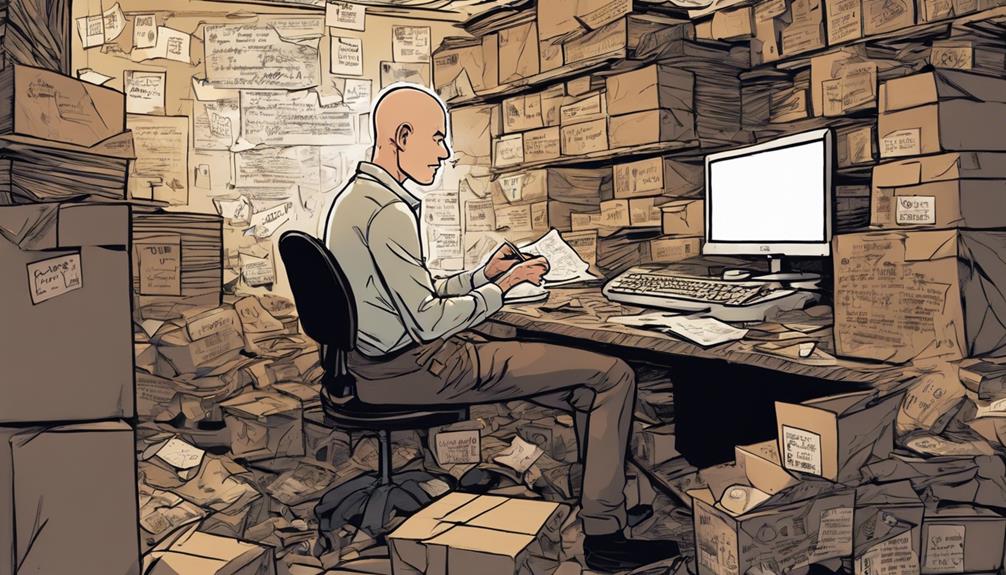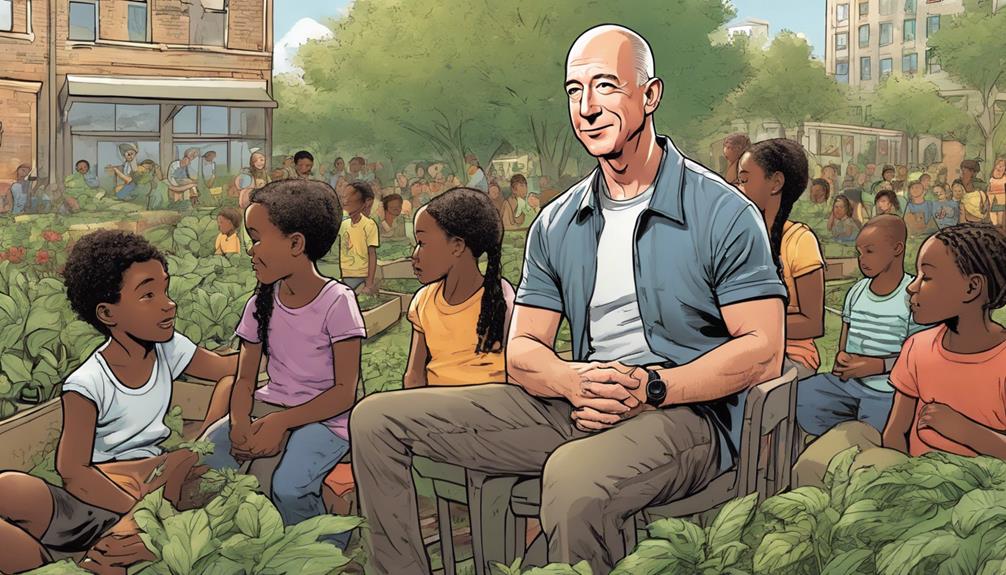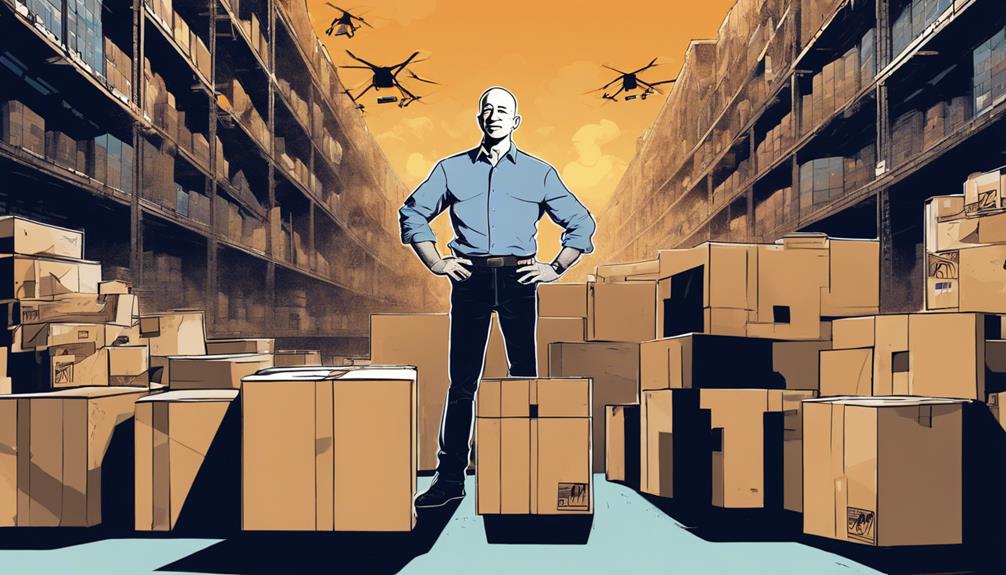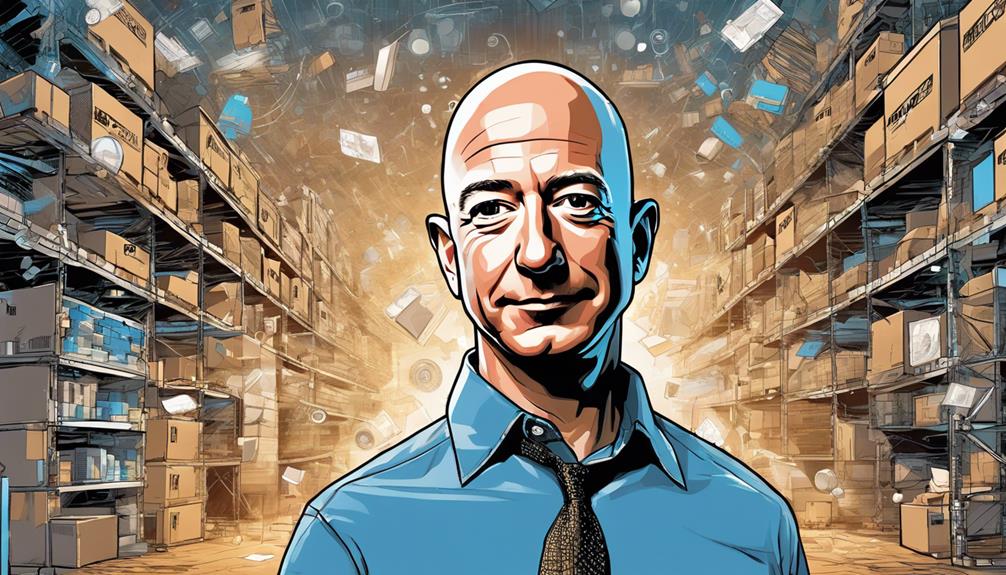Jeff Bezos is a pivotal figure who revolutionized retail and e-commerce. He launched Amazon in 1995 as an online bookstore, quickly expanding its offerings and transforming shopping experiences globally. His innovative approach set new standards for customer service and convenience, pushing competitors to adapt. Beyond profits, Bezos emphasizes philanthropy, focusing on education and homelessness. Though he stepped down as CEO in 2021, his legacy endures in the rise of online shopping and personalized services. If you're intrigued by how his vision reshaped consumer behavior, there's plenty more to uncover about his journey and impact on the world.
Key Takeaways
- Jeff Bezos founded Amazon.com in 1995, transforming it from an online bookstore to a global e-commerce powerhouse.
- His leadership emphasized customer experience, innovation, and personalized shopping, setting new industry standards.
- Bezos' net worth soared to $171 billion, reflecting Amazon's immense growth and his significant ownership.
- Philanthropically, Bezos addresses social issues through the Bezos Family Foundation, focusing on education and homelessness.
Early Life and Career
Born in 1964 in Albuquerque, New Mexico, Jeff Bezos displayed an early fascination with technology and entrepreneurship that would shape his future ventures. As a child, you'd find him tinkering with electronics and dreaming of building something great.
He graduated from Princeton University, where he earned degrees in electrical engineering and computer science. After college, you'd see him diving into the finance world, landing a job at DE Shaw & Co. His six-figure salary showcased his talent, but it was the rapid growth of the Internet in the early 1990s that ignited his entrepreneurial spirit.
You can sense the shift in his mindset—recognizing the potential of e-commerce would soon lead to groundbreaking innovations and a significant impact on retail.
Founding of Amazon

In 1995, Jeff Bezos launched Amazon.com as an online bookstore, seizing the explosive growth of the Internet to tap into a vast market of book enthusiasts. Recognizing a unique opportunity, he carefully selected books as the primary product, thanks to their extensive inventory potential. By July 1995, Amazon offered over 1 million titles, quickly gaining traction.
By September 1996, Amazon achieved $15.7 million in sales.
By 1998, the company expanded its offerings to include CDs and other products, competing directly with established retailers like Barnes & Noble.
The tagline shifted from 'Earth's Biggest Bookstore' to 'Books, Music and More,' setting the stage for Amazon's future dominance in online retail.
This foundation paved the way for Amazon's evolution into a retail giant.
Bezos' Wealth and Ownership

As Amazon grew into a retail powerhouse, Jeff Bezos' ownership stake and wealth reflected his pivotal role in the company's success.
Before stepping down as CEO in July 2021, he owned about 16% of Amazon. After his shift, he sold $8.8 billion worth of stock, reducing his ownership to less than 10%.
Despite this, his net worth remains an astounding $171 billion, according to Forbes. This immense wealth highlights the value of his vision and leadership.
Following his divorce, his ex-wife, MacKenzie Scott, received 4% of Amazon, valued at approximately $38 billion.
Bezos' financial journey illustrates the significant impact one individual can have on a company and the broader market landscape.
Philanthropic Efforts

Engaging in philanthropy through the Bezos Family Foundation, Jeff Bezos focuses on initiatives that address pressing social issues and support community development. His approach reflects a commitment to making an impact in various areas, showing that wealth can be a force for good.
You'll find that his philanthropic efforts target critical needs, including:
- Education: Supporting programs that enhance educational opportunities for underserved communities.
- Homelessness: Funding initiatives aimed at reducing homelessness, particularly in urban areas.
- Climate Change: Investing in sustainable solutions to combat climate change.
- Health: Contributing to healthcare innovations and access for vulnerable populations.
Through these efforts, Bezos demonstrates a desire to drive positive change in society.
E-commerce Impact and Legacy

Jeff Bezos's philanthropic efforts reflect a broader vision that extends into his revolutionary impact on e-commerce, reshaping how we shop and engage with retail today.
You've likely experienced the convenience of shopping online, a shift largely driven by Amazon's innovations. From user-friendly interfaces to personalized recommendations, Bezos transformed the retail landscape, making it easier for you to find and purchase products.
His focus on customer experience set new standards, pushing competitors to adapt or fall behind. The legacy of Amazon goes beyond mere convenience; it's about creating a seamless shopping experience that fits your lifestyle.
As you navigate this digital marketplace, you're part of a legacy that continues to redefine commerce and consumer behavior worldwide.
Business Trends and Innovations

Maneuvering the ever-evolving landscape of business trends and innovations requires staying ahead of technological advancements and consumer expectations. You need to embrace changes and adapt quickly to remain competitive.
Here are some key trends shaping the future of business:
- Automation and AI: Streamlining operations and enhancing customer experiences.
- Sustainability: Meeting the growing demand for eco-friendly products and practices.
- E-commerce Expansion: Capitalizing on the shift toward online shopping.
- Personalization: Tailoring offerings to individual consumer preferences.
Entrepreneurial Lessons From Bezos

Entrepreneurs can learn invaluable lessons from Bezos' relentless focus on innovation and customer experience. He teaches us to prioritize the customer, ensuring their needs drive every decision.
Embrace experimentation; Bezos encourages taking calculated risks to discover what works. Don't shy away from failure; instead, view it as a stepping stone.
Additionally, think long-term. Bezos built Amazon with a vision that extended beyond immediate profits, fostering sustainable growth.
Cultivate a culture of innovation within your team, where new ideas can flourish.
Finally, maintain a willingness to adapt. The market evolves rapidly, and staying flexible is essential for success.
How Did Jeff Bezos’ Innovation Revolutionize Amazon’s Success?
Jeff Bezos’ unparalleled success with Amazon can be attributed to his commitment to unleashing entrepreneurial creativity innovation. By prioritizing innovation, Bezos transformed Amazon from a simple online bookstore into an e-commerce giant that offers a vast array of products and services. This focus on innovation has allowed Amazon to continually evolve and adapt to changing market conditions, solidifying its position as a leader in the industry.
Conclusion
In the grand tapestry of e-commerce, Jeff Bezos weaves a thread of innovation that's hard to ignore. His journey from a modest online bookstore to a retail titan is a beacon for aspiring entrepreneurs.
Just like a river carving its path through the landscape, Bezos's strategies reshape the business world, urging you to adapt and thrive.
As you navigate your own ventures, remember: the spirit of innovation lies not just in the destination, but in the journey itself.









